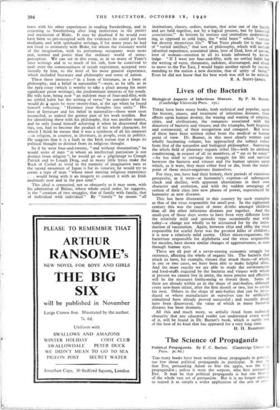Lives of the Bacteria
Biological Aspects of Infectious Disease. By F. M. Burnet. (Cambridge University Press. i51.)
THERE have been many books, both technical and popular, upon the history, causes, and treatment of infectious diseases, their effects upon human destiny, the waxing and waning of empires, cities, and civilisations, the romances associated with the discovery of bacteria and viruses, and the triumphs, both hygienic and commercial, of their recognition and conquest. But most of these have been written either from the medical or human point of view. Dr. Burnet, in this most clearly written and wholly fascinating volume, has approached the subject rather from that of the naturalist and biological philosopher. Surveying the whole field of planetary organic tribal life—with its ultimate conditioning, in respect of all its members, of " eat or be eaten " —he has tried to envisage this struggle for life and survival between the bacteria and viruses and the human species upon which, as it were, they must either feed or die, from the stand- point of these micro-organisms themselves.
For they, too, have had their history, their periods of victorious prosperity, as it were—at humanity's expense—of subsequent check and decline, with apparent alternations in their own character and evolution, and with the sudden emergings of certain of their class into new phases of power, experienced by humanity as new diseases.
This has been illustrated in this country by such examples as that of the virus responsible for small-pox. In the eighteenth century this was the cause of more deaths amongst children than all the other infectious diseases put together. And the small-pox of those days seems to have been very different from the relatively mild and sporadic type occasionally met with today—a change not wholly to be accounted for by the intro- duction of vaccination. Again, between 185o and 188o, the virus responsible for scarlet fever was the greatest killer of children ; it is now a relatively mild enemy. Other micro-organisms, the bacterium responsible for diphtheria and the virus responsible for measles, have shown similar changes of aggressiveness, as seen through human eyes.
These are all part of a never-ceasing economic struggle for existence, affecting the whole of organic life. The bacteria that attack us have, for example, viruses that attack them—of which, in one or two cases, we have been able to make helpful allies. And the more exactly we are able to study the environments and food-stuffs required by the bacteria and viruses with whom at present we cannot live in amity, the more precise and effective will be the measures forthcoming to thwart them. Some of these are already within us in the shape of anti-bodies, although every new-born infant, after the first month or two, has to create his own. Others in the shape of anti-bodies that can be intro- duced or whose manufacture in ourselves can be artificially stimulated have already proved successful • and recently drugs have been discovered, the value of which in many bacterial diseases has been dramatic.
All this and much more, so artfully freed from technical obscurity that any educated reader can understand every word of it, will be found in Dr. Bumet's book, which is surely one of the best of its kind that has appeared for a very long time.
H. H. BASHFORD.






























 Previous page
Previous page